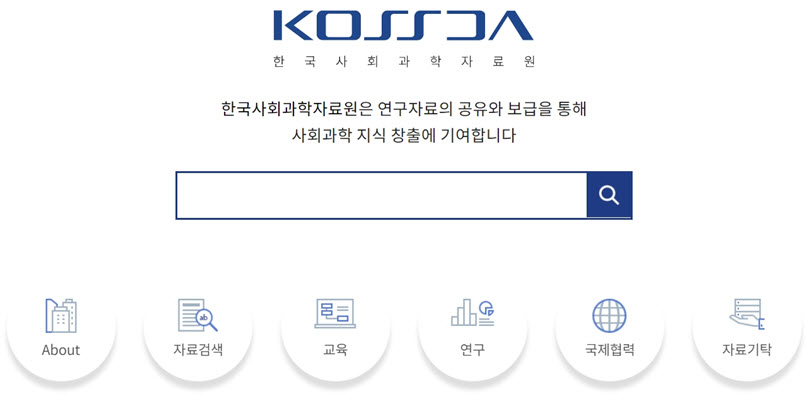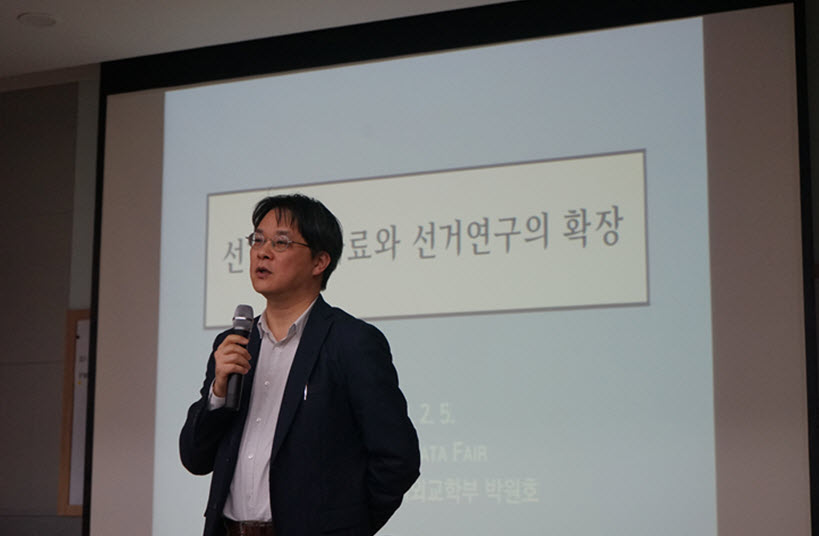For social science researchers in fields such as economics, psychology, and sociology, data analysis is a necessary procedure to reach an accurate conclusion, and the amount and importance of data that should be dealt are growing day by day. In April, the Korea Social Science Data Archive (hereinafter referred to as "KOSSDA") which was under the Asian Center changed to an independent institution that belongs to the College of Social Sciences. Won-Ho Park (professor in the Department of Political Science and International Relations), the newly appointed director, shared the story of KOSSDA, which will expand the role as an institution in school through reopening.
KOSSDA is useful in both education and research
Founded in 2006 by the Lee Inpyo Foundation, which has established various academic institutions in Korea, including the Seoul National University Social Sciences Library and the Korea Social Science Library, the organization was transferred to the Seoul National University Asia Center in 2015 to maximize the synergy effect of the archiving project. Having been under the Asia Center for more than seven years since then, KOSSDA felt the need to expand the infrastructure for data-based education, and thus decided to separate itself as an independent research facility in the College of Social Sciences last year. As a data archive that collects and serves research data from all areas of social science such as politics and culture, KOSSDA has a total of 3,000 datasets donated by the National Human Rights Commission of Korea, government-funded research institute under the National Research Council for Economics, Humanities, and Social Sciences, universities and private research institutes. An average of 50,000 people, including graduate students, researchers at government-funded research institutes, and professors use the KOSSDA website annually.

The Homepage of KOSSDA
In addition to data archiving, KOSSDA runs various methodology workshops online along with on-site lectures at Gwanak Campus and Yeongeon Campus. Hyo-Won Kim (Department of Sociology, Master's Degree), who learned about KOSSDA while preparing for graduate school admission, said that methodology lectures are so popular that you have to apply right when the registration begins because they provide practical help in writing your thesis. Hyo-Won Kim recommended researchers to use the ‘newsletter mailing service’ which includes the latest research trends and news of the event quickly. In addition, KOSSDA holds a thesis contest in March every year that accepts research papers conducted using data from the collection. As such, KOSSDA's service helps both research and education, so it is a necessary stopover for those who start studying social science. KOSSDA can be used free of charge by anyone through easy membership registration, which is completed by putting in email and basic information.
Significance of KOSSDA as an institution in school has grown through reopening
Its position as an institution in school brought various changes to KOSSDA. First, three new departments were established, with professors from various fields in the school joining KOSSDA. Planning & Research Department with Seok-Ho Kim (Department of Sociology) as associate director, Data Archiving Department with Kilkon Ko (Graduate School of Public Administration) as associate director, and Education Department with Byungjoon Yoo (Graduate School of Business) as associate director were newly created. In the future, KOSSDA plans to collect and archive research data on campus regardless of data types such as structured data and unstructured data. Along with that, KOSSDA plans to focus more on research methodology education. Director Won-Ho Park said, "We plan to gradually provide an integrated methodology education program starting from 2023 which informs how to find data suitable for research topics and draw meaningful conclusions through analyzed data."

Director Won-Ho Park is presenting his research in Data Fair held by KOSSDA
Director Park emphasized that KOSSDA is an important institution in charge of the basics of social science research, like a library where many great ideas begin. In fact, according to the performance report released by KOSSDA, in 2019, it produced social value that is nine times the cost of the archiving project. "Direct access to the original data is the same as asking questions to the most fundamental part of the research," he said. "That experience will open a new perspective on academics and the world," and encouraged members of the school to use KOSSDA if they do not yet. In addition, KOSSDA holds a data fair in February and September every year where data producers introduce data directly and share users' data analysis experiences. The data fair can be seen as the summary of the achievements of social science, and the last fair is uploaded on YouTube. (https://www.youtube.com/watch?v=aIJcwUKND4M).
KOSSDA is preparing a new service for students in addition to its preexisting services through reopening this month. In June, an online reopening ceremony will be held along with the renewal of the website to deliver details on how to use KOSSDA effectively. KOSSDA is a major academic institution in charge of research and education, but at the same time, it is also a nationally important institution. Archiving of data sources that follows international standard metadata can play a major role in combining data between domestic and foreign countries and help establish national policies. Anyone who explores how to use data in a macro-level among numerous data will have an eye for understanding the world and academic knowledge at the same time.
KOSSDA Webpage: https://kossda.snu.ac.kr/
KOSSDA Methodology Education Website: https://kossda.methods.snu.ac.kr
SNU student reporter
Nari Nam (Department of Mathmatics Education)
narista00@snu.ac.kr
Translated by
Jungyun Oh (Department of Aesthetics)

